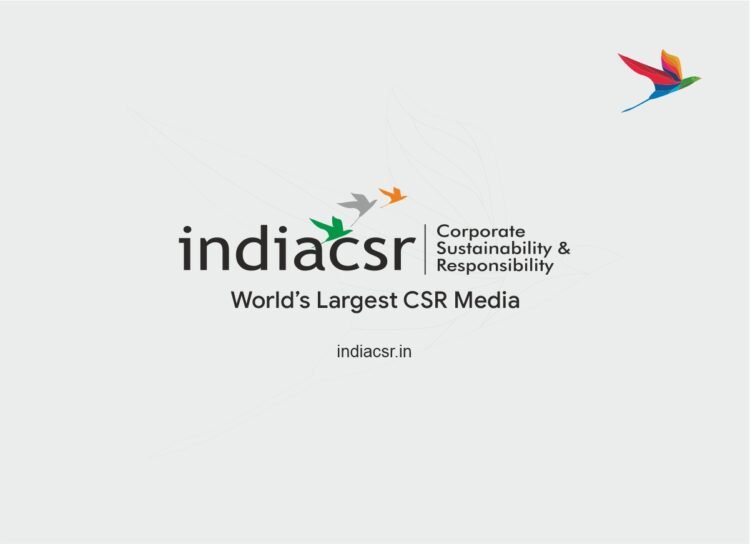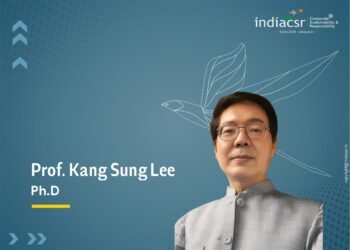NEW DELHI (India CSR): Pratyush Panda, Corporate Head –CSR at ACC Limited spoke with Rusen Kumar, Editor, IndiaCSR about his company’s vision, CSR projects, CSR journey and how CSR interventions are contributing to the nation. Edited excerpts:
Tell us about ACC Journey and its business philosophy?
ACC Limited is among India’s foremost manufacturers of Cement and Ready Mixed Concrete with a country wide spread of factories, sales offices and distribution points. ACC was established in 1936 and is acknowledged as a pioneer and trendsetter in the cement and concrete business.
We have always taken innovative steps in knowledge building and innovation in our manufacturing and operating processes. Having the distinction of being the first cement company in India to establish its own Research & Development center, we encourage and foster innovation in our products, most significantly with the promotion of eco-friendly blended cements. The company takes special care towards building a safe and green supply chain system.
ACC has always demonstrated a deep commitment to enriching the lives of the community that lives around its operations. Over the years the company has been felicitated several times for its community development achievements, crisis relief assistance, fair business practices and sustainable development by eminent bodies such as CII, FICCI, Council for Fair Business Practices and PHD Chamber.
Can you discuss your company’s CSR journey?
ACC has undertaken social volunteering practices almost from its inception, its earliest initiatives in community development dates back to the 1940’s, with the launch of the first formal Village Welfare Scheme in 1952. The communities living around most of its cement plants comprise the weakest sections of rural and tribal India with little access to basic amenities. Together with its countrywide network of employees and associates, ACC has always stepped forward to assist the authorities in times of national disasters to provide immediate life-saving emergency relief as well as more valuable long term responses.
Our history shows that from the very inception, we have perceived the communities living around our operations to be our key stakeholders. Our social volunteering initiatives began early. In the early years when new cement plants were set up mostly as greenfield projects in backward regions, the company would work with the local communities there to upgrade their quality of life by sharing some basic amenities, connectivity and infrastructure. We have references of community development schemes as early as 1944. In 1952 a formal Village Welfare Scheme was launched which was a precursor to the present day activity of CSR. In this phase the company evolved a clear approach and vision, aligning community development initiatives to the needs of the areas around our operations so as to add greater value with our interventions. A full-fledged team was put in place centrally and at each major plant location comprising people with some expertise in social sciences, health, agriculture and training.
Today our CSR initiatives reach out to the people residing around all our operations and whenever required to those affected by disasters in the country. The focus of all initiatives is to provide literacy and education, preventive health and sanitation, livelihood creation, enhance employability and income generation, women empowerment and augmentation of the community infrastructure.
What is the implementing method of CSR?
To begin with we refer to any published or readily available information about the well being of the people in the region such as the Human Development Index (HDI) as a decisive tool. Next we assess the needs of the community around our areas of operations. Rather than adopting a generalized approach, ACC believes in doing this exercise in a participative manner in consultation with representatives of the community. ACC actively engages with the communities at the grass-root levels and draws a relevant CSR program to make each community and village self-sustainable. Recently ACC has also aligned its CSR policy and its programming with respect to 13 out of 17 UN Sustainable Development Goals and its 169 Targets.
Our CSR initiatives are delivered in partnerships with NGOs and other institutions. We conduct base line studies and need assessment surveys before initiating any community development projects. A formal Community Advisory Panel (CAP) is formed involving local stakeholders such as Panchayat representatives, villagers, district officials, health workers and self-help groups (SHGs). The priorities are discussed with the community to formulate a Community Development Plan (CDP) comprising of projects, schemes and action plan. The projects are implemented in collaboration with like-minded organizations like governments, voluntary organizations and development banks. Stakeholder Engagement Survey (SES) is an integral part of our CSR activity, conducted at each plant location every year. SES generates a feedback on progress and outcomes of the projects conducted during the year. This helps in making the CSR initiatives more appropriate to community needs and enhance sustainability.
Through our current projects, we actively assist these communities in identifying, prioritizing and meeting their developmental aspirations. We have adopted participatory community self-reliance initiatives across our sites in India by creating forums such as Community Advisory Panel (CAP) which acts as a platform for the community, local district administration, NGOs and other opinion groups to come together and implement projects. The panels have proven to be valuable in presenting stakeholder views, reviewing the progress of community projects, obtaining timely feedback from stakeholders and ensuring appropriate delivery of planned initiatives in a participatory method.
Do you have a CSR committee of the Board as per CSR Law?
We have a Corporate Social Responsibility Committee of the Board of Directors comprising four Directors who meet periodically to provide guidance on various CSR activities and monitor their progress. The committee has reviewed the company’s CSR policy to make it more comprehensive and indicative of the activities to be undertaken as per Schedule VII of the Companies Act, 2013.
What is your CSR team strength?
We have a team comprising of 23 qualified professionals from well-known institutes such as XIMB, TISS, XISS and IRMA. All of them have undergone IICA Certified Courses on CSR and the Companies Act 2013.
What are key CSR projects initiated at plant locations?
Overall CSR Projects are developed for the next 3-5 years that have 5 thrust Areas for Intervention, which are in line with Schedule VII of Companies Act 2013 and beyond business as usual (Ref. Annex. Xx). The project initiatives mainly focus around the host communities of business/plant operations.
A. Livelihood, Employability and Income Generation
i. ACC DISHA – This project objective is to provide alternate livelihood around plant locations to 10,000 youth per annum either through training & placement or through self employment initiatives.
ii. ACC Swawlamban – This project focuses on empowerment of 10,000 women through formation of Self Help Groups (SHGs) and SHG federations and aiding them in establishment of microenterprises to increase their family income and decision making abilities.
iii. ACC LEISA (Low External Input Sustainable Agriculture) – Objective of this project to increase farmers’ income by adopting sustainable agricultural and animal husbandry practices.
B. Improving Quality and reach of Education
iv. ACC Vidya Utkarsh: The project is purposed to facilitate reach of quality education to every child in the host community.
v. ACC Vidhya Sarathi: Scholarships for meritorious students to ensure better higher education opportunities for deserving students.
C. Enhancing Health and Sanitation
vi. ACC Arogyam: This project is intended to support enhancement of health and well being among the host communities through preventing of diseases, promoting of environmental health, safety and healthy behaviors. The emphasis is mainly on preventive health care initiatives and limited curative health interventions.
i. Anti Retroviral Treatment (ART) Centre for HIV/AIDS treatment at Wadi, Karnataka was set up by ACC as it was observed that the virus was highly prevalent in the villages around ACC Wadi Cement Works.
vii. ACC Sampurna Swachhata: This is an initiative to promote personal hygiene, open defecation free environment and safe disposal of waste. The project particularly targets to eradicate the practice of open defecation in plant neighborhoods by not only facilitating in building of infrastructure but also bringing change in behavior and cultural norms.
D. Community Environment Sustainability
viii. Sanrakshit Paryavaran Initiatives under this project are meant for promoting reduced/prudent use of resources; enhance their quality/availability in the neighborhood area, and further reuse/recycle/manage wastage to ensure sustainability of resources for posterity.
i. Solar Grid Initiative at Tikaria, Uttar Pradeshan innovative model which uses renewable solar power to generate electricity at a very low cost. It was found that the residents in the area were forced to live in the dark after sunset. Therefore, ACC installed solar grid panels in Tikariato provide electricity to the residents at just Rs. 150 per month.
ii. Clean and Green Madukkarai, an initiative which aims at creating and strengthening the mechanism for effective disposal of solid and domestic waste of the community. ACC partnered with Madukkarai Town Panchayat and Hand in Hand Trust to implement the Solid Waste Management in Madukkarai.
E. Promotion of Sports, Arts and Culture
ix. ACC Drona: Purposed to promote sports in the local area for facilitating physical fitness, social interaction, enhance competitiveness , inculcate discipline and team work in particular and general entertainment of the larger population. Further encourage local Arts and Culture to flourish and sustain its uniqueness for the posterity.
ACC Save Kids Lives initiative at Lakheri, Rajasthan was launched with an aim to spread road safety awareness as part of the UN Global Road Safety Campaign. ACC has been working towards creating awareness among drivers, officers, parents and children on road safety. The initiative also included a special programme conducted for local drivers and transporters to inform them about safety measures that can be implemented.
Basic infrastructure development, Human Rights, Affirmative Action and Women Empowerment are cross cutting themes across aforementioned CSR initiatives.
Brief about the project for HIV /AIDS people. How project Anti-Retroviral Treatment (ART) Centre for HIV/AIDS treatment is impacting the lives?
ACC was among the first companies in the corporate sector in India to establish treatment centres to combat the national scourge of HIV/ AIDS, recognized at that time as being of India’s major public health issue. In 2007 the company set up two Anti Retroviral Treatment centres for patients of HIV/AIDS in two states suffering the country’s highest prevalence of the disease. The company established the ACC Ayushman Trust at Wadi in Karnataka and the ACC CMC Trust for Infectious Diseases (ACTFID) at Vellore in Tamil Nadu in association with Christian Medical College.
Also, centres for awareness, prevention and treatment of Sexually Transmitted Infections (STI) were established at Gagal in Himachal Pradesh and Tikaria in Uttar Pradesh. In all 3042 HIV/AIDS affected persons were supported through counselling, testing and treatment through Anti Retroviral Therapy (ART) and STI Centers.
What are the key objectives of carrying such projects?
The company’s livelihood activities around the plants ensure economic well-being and development of the local community. Therefore, ACC has always prioritized Livelihood, Education, health issues and laid emphasizes on organizing free health camps, blood donation camps, free check-up camps, women’s health awareness programmes, first-aid training,etc for people living around ACC plant units.
How #SaveKidsLives campaign has been enhancing road safety awareness as part of the UN Global Road Safety Campaign in Rajasthan?
ACC’s Lakheri Cement Works became the first to implement the UN #Save Kids Lives initiative by organizing a “Defensive Driving” training for employees, drivers and school children. More than 350 students participated in this programme and ‘Champions’ from these schools have been identified to play a vital role in propagating the UN Child Declaration to the public.
A separate programme was conducted for the local drivers and transporters associated with the Lakheri plant operation. A Sadak Suraksha Rath (Road Safety Cart) with an audio visual public address system covered four villages around Lakheri. The Hindi translation of the UN child declaration was also widely distributed through pamphlets in these villages. Additionally, a poster making and slogan competition was also organised for the children to make them aware of the concerns of road safety.
Going beyond the UN Road Safety Week, ACC has also decided to make this initiative, a part of an ongoing three-year commitment to road safety to be implemented as a CSR project. ACC Units across the country have already nominated ambassadors from among their employees to steer the programme. #SKL is a PAN India project for ACC which is ongoing across 14 plants and 21 sales unit location through employee volunteering project. As of now over 40,000 children from 190 villages and over 1000 drivers has been covered in this project.
Kindly give some insight about Clean and Green Madukkarai project.
ACC Madukkarai Cement Works initiated a drive aiming at creating and strengthening the mechanism for effective disposal of solid and domestic waste of the community – Clean and Green Madukkarai. ACC partnered with Madukkarai Town Panchayat and Hand in Hand Trust to implement the Solid Waste Management in Madukkarai. This initiative took several steps to turn Madukkarai into a garbage free society.
ACC Limited created a group of Green Friends (garbage collectors) who were provided with all protective equipment like gloves, mask, jacket and cap. The Green Friends apart from door to door collection of garbage were also involved in Mass Cleaning in Community, Segregation of Dry and Wet Garbage, Maintaining the Garbage Yard, Creation of Vermi Compost Pits and Organic Manure.
ACC also ran an awareness program where people were continually educated about the importance of waste segregation and effective disposal of garbage. Additionally door to door campaign, audio campaign, awareness program and street plays created awareness about effective solid waste disposal and importance of waste segregation.
What are the other CSR projects?
On the education front, ACC benefited more 29,161 children in neighborhood communities in the year 2014. ACC has established schools at all its locations, where children of employees and those from surrounding communities are provided good quality education. Management of these schools is outsourced to reputed educationists like the DAV or the best locally available institution, there by ensuring that the schools maintain high standards of education.
Also, meritorious students from weaker sections of the community are encouraged through the grant of scholarships. 29,161 students received quality education in the plants’ neighborhood schools while about 504 meritorious students from weaker sections of society were awarded scholarships so that they could continue with their education. Smart classes and interactive kiosks were offered to children in 26 rural schools in a bid to keep pace with modern methods of learning available in city schools. The “ACC ki Ladli” Project was successful in ensuring that more than 750 girl children were able to renew education in the past one year.
What is your annual CSR budget?
ACC’s welfare and development schemes has continued to benefit the community around the company’s plants through activities such as health care, education, vocational guidance, sustainable livelihoods, and women’s empowerment. Consistent with the previous levels of commitment, ACC spent 27.45 crore on CSR in 2014 meeting the 2% of net profit recommendation for CSR expenditure prescribed in the Companies Act 2013.
What challenges you are facing at community level to implement CSR projects?
Two major challenges are being faced by us. First paradigm shift among stakeholders mindset from Govt run projects to CSR project. This is resulting in poor utilization of Govt schematic budget). Secondly lots of inappropriate request coming from external stakeholders which no more coved in CSR as per Company Act 2013.
What is your definition for the CSR?
In a larger broader sense, the term CSR indicates commitment of a business to contribute to all round sustainable development, working with various stakeholders like employees, their families, the local community and society at large to improve their quality of life. CSR also often refers specifically to community development and social engagement practices.
According to you how CSR culture is taking roots in India?
ACC has had a long tradition of planned social volunteering and engaging with local host communities, long before the term Corporate Social Responsibility was coined. We are proud of the fact that ACC was the first recipient of what can be called India’s very first CSR award which was the National Award for outstanding performance in promoting rural and agricultural development activities instituted by ASSOCHAM in 1976. I must admit that like us there are other companies with established CSR practices. In fact this was featured in a news story recently where ACC’s CSR programme was ranked 12th in India and best in Cement sector. ACC CSR projects are always sustainable in nature. We often receive requests from corporate fraternity to share our CSR best practices, CSR Governance mechanism and CSR Monitoring & Evaluation mechanism. Today of course CSR is part of Company law and this will no doubt accelerate the pace of CSR activity in the country.
About the author
Rusen Kumar is the Editor at IndiaCSR.in.
You may also like:
- Our save the tiger programme contributed significantly to tiger conservation: Brinda Malhotra, Head CSR, Aircel
- Our Eco Smart Toilet addresses the sanitation needs and we are proud of it –Amit Mittal, CMD A2Z Group
- We Have Supplied 20,000 Readymade Toilets on No Profit – No Loss Basis: Ramdas Mansing Mane, Chairman, Mane Group
- BT sustainability strategy is focused on using power of communications to make a better world: Niall Dunne, Chief Sustainability Officer






















